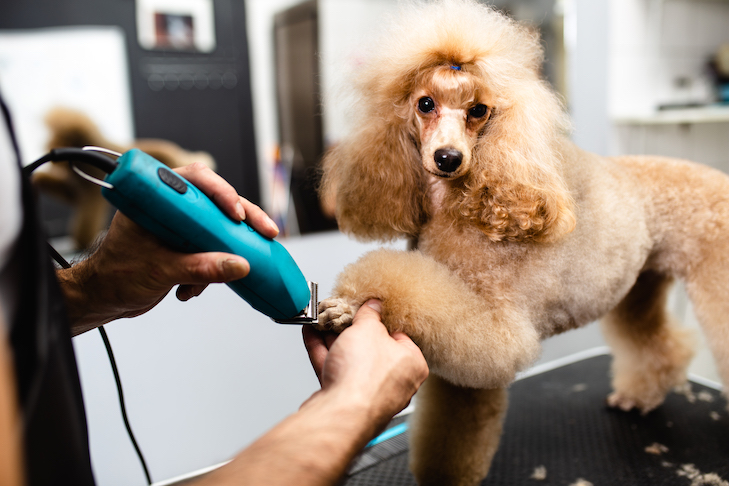If you’ve ever caught your dog doing the infamous bum-scoot across the carpet and thought, “What in the world is that about?,” you’re not alone.
Loads of dog owners have been there. First time it happens, it’s equal parts confusing and hilarious, until someone tells you, “Oh, that’s probably the anal glands.”

Right then. That’s when the questions start. Do I need to do something about it? Do I book a vet? Or will my groomer just sort it during their usual visit?
Short answer? In the UK, most dog groomers won’t express your dog’s anal glands, and legally, many aren’t allowed to. But there’s a bit more to it than just yes or no.
What Even Are Anal Glands, and Why Do They Bother Dogs?
Don’t worry, this isn’t going to get all technical. The basics are simple: dogs have two small sacs near their bottom that release scent when they poo. Nature’s little ID tag.
Sometimes those sacs don’t empty properly. That’s when things get uncomfortable. Dogs start scooting, licking their bum, or you might notice a very… specific fishy smell.
It’s not fun, not for them and not for you.
So… Do UK Groomers Express Glands?
Technically, external expression of anal glands is not illegal for groomers in the UK, but it comes with a big “if.” If they’re properly trained, if they’re insured for it, and if it’s absolutely necessary, some groomers will do it.
That said, many UK groomers choose not to express glands at all, and here’s why: it’s considered a medical issue.
The British Dog Groomers’ Association and many local councils advise groomers to refer dogs with suspected gland problems to a vet, not to take matters into their own hands.
Internal expression? That’s definitely a no-go unless you’re a vet. End of story.
Why Do Vets Handle This More Often Than Groomers?
Because gland issues can be more complicated than they look. Sometimes it’s just a bit of built-up fluid. Other times, it’s an infection, impaction, or worse, a ruptured gland that needs actual medical attention.
A vet can check what’s really going on and deal with it safely. They’ve got the equipment, the training, and honestly, the stomach for it.
So when a groomer spots something a bit off, maybe the dog’s scooting, licking obsessively, or the smell is enough to knock your socks off, they’re doing the right thing by sending you to the vet, not trying to fix it on their own.
Grooming and UK Regulations
In the UK, grooming isn’t currently a regulated industry by law, but professional groomers often follow guidance from groups like the Pet Industry Federation or the British Dog Groomers’ Association.
A lot of groomers carry insurance that excludes any kind of medical procedure. That includes anal gland expression, even external. If they did it anyway and something went wrong, their insurance might not cover them.
That’s a big risk, and many groomers simply aren’t willing to take it. And who could blame them?
What Happens in Other Countries?
In places like the US, anal gland expression is more commonly done by groomers, especially in big box grooming salons.
It’s often included in standard packages. But even then, laws vary by state, and many American groomers are moving toward vet-only expression too, for safety reasons.
So if you’re comparing what you’ve seen on TikTok to what happens in your local UK salon, just know things are handled differently depending on where you are.
Can Groomers Spot a Problem?
Absolutely. Good groomers are like your dog’s second set of eyes. They notice when something’s up. Maybe there’s swelling back there, or the dog reacts when they touch the tail area, or that telltale smell turns up halfway through a haircut.
But noticing something and treating it are two very different things. Most groomers will give you a friendly heads-up and suggest a vet visit if anything seems off.
That way, your dog gets the right care from the right professional, and everyone avoids any messy complications.
Want to Help Your Dog Stay Comfy?
If your dog is prone to gland issues, you can talk to your vet about adding more fibre to their diet, which can help keep things moving. Regular poos of the right firmness help the glands empty naturally.
And don’t be afraid to chat to your groomer about anything they’ve noticed. Most will be more than happy to keep an eye on things during routine appointments, even if they don’t handle the glands themselves.
Thinking of becoming a groomer?
If you’re in the UK and training as a dog groomer, you’ll probably learn about anal glands in your coursework. You’ll be taught to spot signs of trouble, but also when to refer to a vet.
It’s part of being a responsible professional. Knowing when not to do something is just as important as knowing how to clip a paw or trim a tricky fringe.
And if you’re hoping to offer gland expression in your services? Make sure you’re trained, insured, and totally clear on the legal and ethical side of things.
Anal gland talk is never glamorous, but it’s part of the weird world of dog ownership. While groomers play a huge role in your dog’s hygiene and well-being, some jobs are just best left to the vet’s table.
So next time your dog starts scooting or smelling a bit… fishy, don’t expect the groomer to sort it quietly. That’s a vet job.
Better safe than sorry, right?
What’s the oddest thing your groomer ever noticed about your dog during a visit?